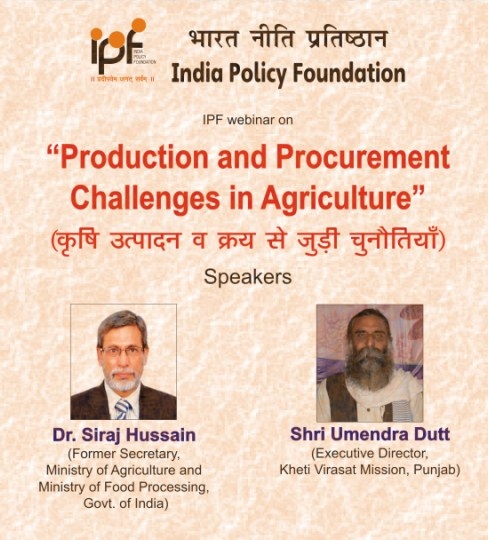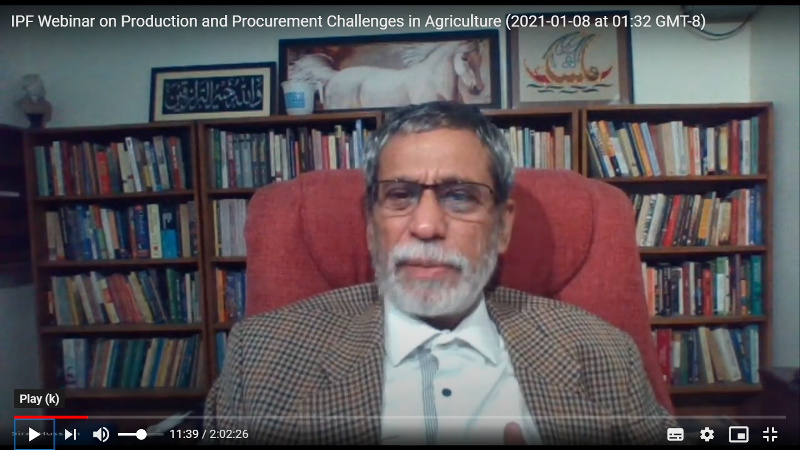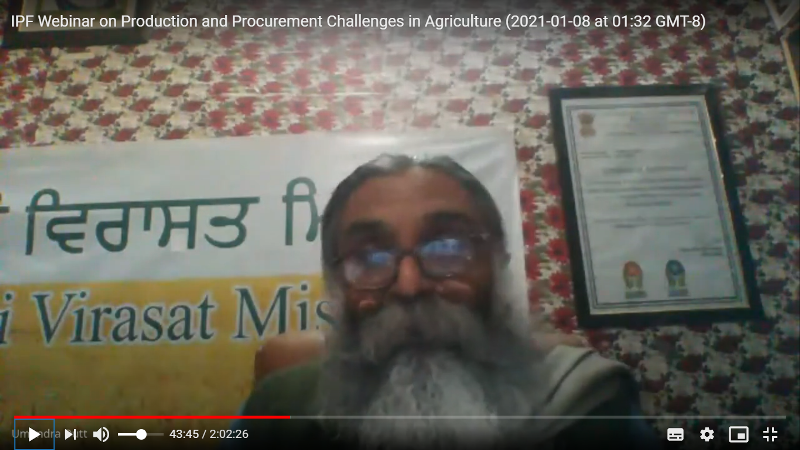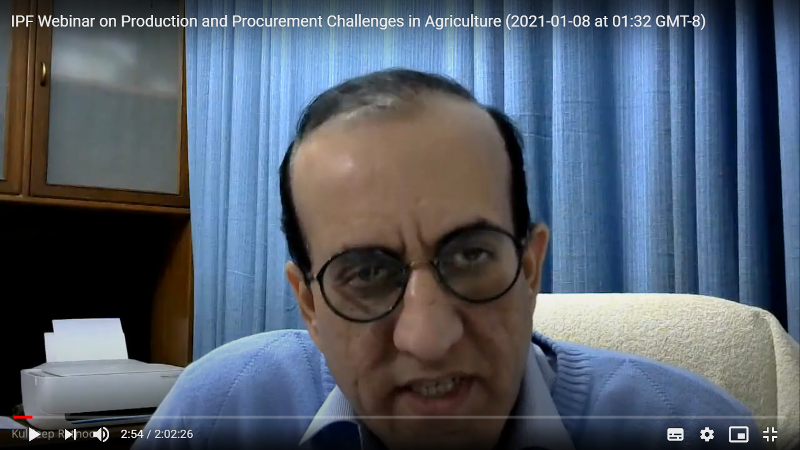Production and Procurement Challenges in Agriculture
Total Views |
IPF Webinar
on
Production and Procurement Challenges in Agriculture
January 08, 2021

Speakers:
Dr Siraj Hussain
(Former Secretary, Ministry of Agriculture and Ministry of Food Processing, Government of India)
Shri Umendra Dutt
(Executive Director, Kheti Virasat Mission, Punjab)
Government cannot procure all agri produce on MSP: Dr Hussain

“The factors that helped the farmers of Punjab and Haryana to reap the benefits of Green Revolution have become points of contention now,” observed Dr Siraj Hussain, Former Secretary, Ministry of Agriculture and Ministry of Food Processing, Government of India. He was speaking at a webinar on ‘Production and Procurement Challenges in Agriculture’ organised by the India Policy Foundation on January 08, 2021.
Elaborating on this point and referring to discontent among the farmers, he said, it is not possible to procure all food grains on Minimum Support Price (MSP). He pointed out that the government is paying a huge cost due to the schemes that were introduced during Green Revolution. Citing the example of wheat, he said, even if the government procures wheat for a sum of Rs 18 per kilogram (kg), the economic costs of this goes up to Rs 25 per kg. Similarly, for rice it goes up to Rs 35 per kg. However, the government has been successful in ensuring food security, because the grains are distributed free or at very low price to nearly two-third population of India through Public Distribution System (PDS).
Dr Hussain outlined three important characteristics of Indian Agriculture which are important in determining methods of procurement. Firstly, he threw light on why Agriculture is a state subject in the Indian Constitution pointing to the different conditions within states and how it is impossible to formulate a uniform law for the entire nation.
“The percentage of land holdings and the irrigation needs are also different across and within states. So, the decision to divide India into different agro-climatic zones was the correct approach,” he added.
Secondly, he focussed on how the Indian government in the past seven years had implemented a number of significant policies in the agricultural sector with focus on doubling the income of farmers and ensuring market access among others. He noted that initiatives like E-Nam, Pradhan Mantri Fasal Bima Yojana were good initiatives.
Thirdly, he applauded the state governments of Punjab and Haryana, where the Green Revolution really took shape. He noted that the farmers in these states had access to APMC mandis which ensured efficient procurement of grains. In addition to this, the formation of Food Corporation of India along with Agriculture Marketing Commission ensured that the farmers got fair prices for their output.
“There is a huge structure to enable the procurement of wheat and rice grains in the country that was facilitated by the FCI. They built and rented warehouses at numerous places. It was decided that the surplus grains will be given to states that are facing a shortage. For example, the grains from Punjab and Haryana have been going to Uttar Pradesh and other states as these did not have any surplus production or storage facilities,” he said.
He also brought attention to the fact that between despite sufficient food grains production over the years, India had to import wheat during 2006.
Highlighting the factors that have worked in favour of procurement, Dr Hussain raised a question that while demand for procuring all the grains at MSP sounds good, but where will the government store these grains when there is low demand? He gave the example of maize which had higher MSP, but poor demand in the market when Covid-19 pandemic struck, to substantiate his point.
“Though the government asks farmers to cultivate only those crops which have a demand in the market, a valid question that farmers have been asking is how do they figure out which crop will be in demand? This problem is there with all crops except sugarcane which is covered under Fair and Remunerative Price. This is a question that needs to be debated and pondered over,” he stressed.
He said there are no easy solutions at present to this problem and suggested that one possible way may be to ensure direct income support to farmers like that given in China.
Taking this discussion forward, Umendra Dutt, Executive Director, Kheti Virasat Mission, Punjab said, the Food Security model focussing only on wheat and rice was introduced at a time when India was staring at a food crisis and had to address an emergency.

“Now after 40 years, we have begun to realise that this concept of food security was reductionist,” he added.
Citing the examples of chickpeas and millets that were once grown in abundance in Punjab and have since completely taken over by wheat and rice due to MSP model, he said, “We relied on a wrong model of food security, perhaps to meet the needs of that time. So, it was the responsibility of the government to procure those grains that they asked the farmers to cultivate.” But now the ill-effects of that model are visible all over Punjab and there is urgent need for crop diversity and food diversity.
He opined that all stakeholders should build a wider national political consensus on this issue that goes beyond political differences. He added that there is also a need for social consensus with the involvement of farmers on the issue of MSP and procurements.
“The wrong model of food security has erased agricultural diversity from the country,” he observed.
Focussing on the issue of MSP, he said MSP model of farming is responsible for drying up of underground water sources in Punjab. He pointed out that in 1971, Punjab had around 1,90,000 tube wells but now the figure stands at 15,00,000. He also stated that bureaucracy should have raised concerns when politicians decided to give free electricity to farmers for cheap political gains. But that did not happen and Punjab is paying a heavy price for it. He pointed out that stubble burning is also a result of monoculture and MSP model.
“It is not wrong to say that the whole model of Green Revolution has pushed Punjab into a civilizational crisis,” he said.
As a possible solution to the problem, he said, “Every state should think of meeting the requirements of at least 4-5 commodities locally. Then farmers won’t be dependent on MSP.”
He stated that after finding a way out of the present stalemate, the government should sit with various farmer unions, political parties and all the other stakeholders involved to chart the way ahead.
“What is needed is a paradigm shift,” he observed.
Dr Kuldeep Ratnoo, Director, India Policy Foundation moderated the session. He observed that there are three angles related to procurement - pricing, storage and distribution, and without addressing all three aspects, governments can not do much to improve conditions of farmers.

To a question posed by Dr Ratnoo on the issues of price and storage, Dr Hussain said that the farmers should get a fair price but that cannot be ensured by the government forever and new ways have to be found.
He pointed out that there were provisions in the Food Security Act to increase the price of grains for the needy but that did not happen.
“Should we really give wheat and rice at Rs 2 and Rs 3 per kg to 67 per cent of our population? My answer is in the negative,” he said.
Suggesting solutions to the storage and wastage problem, Dr Hussain said, we should build more silos in agriculture and we need huge investments in building our storage capacities.
Shri Dutt putting forth his opinion on the issue suggested that the government should come out with a white paper on this topic and equilibrium can be reached only if there is diversification of agricultural produce.
Dr Ratnoo pointed out that the current policies have been pushing farmers into a vicious cycle where to protect the poor, the farmers are pushed into poverty.
Dr Hussain agreed with this observation and said, we should avoid frequent shocks to the economy, so that alternative income avenues can be made available to farmers. Till then, direct income support will be a better way to maintain farmers’ income.